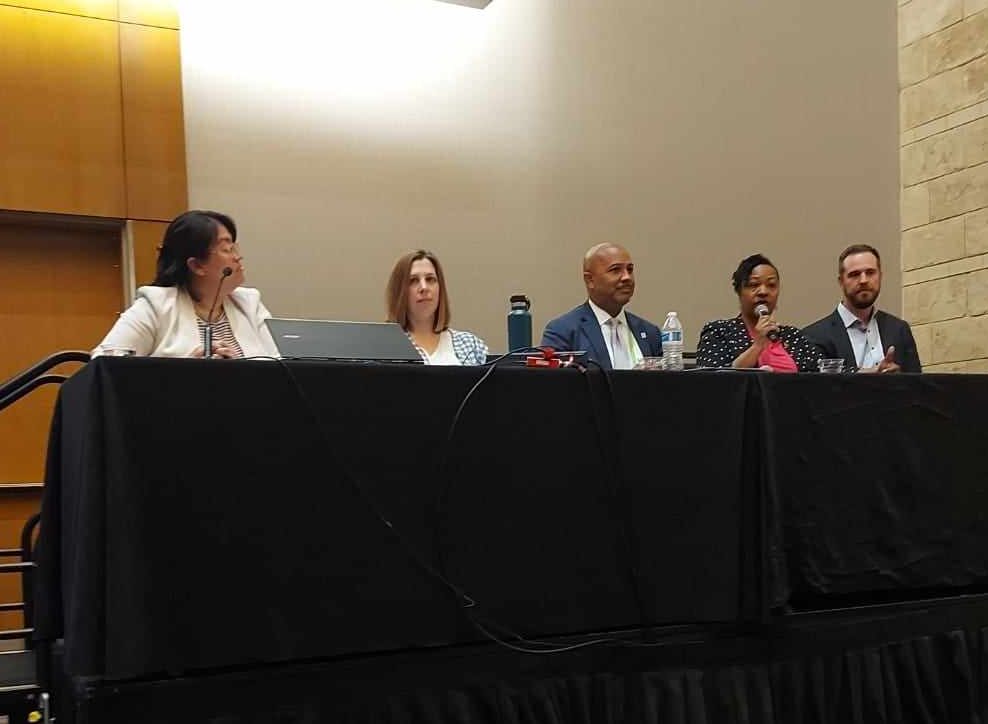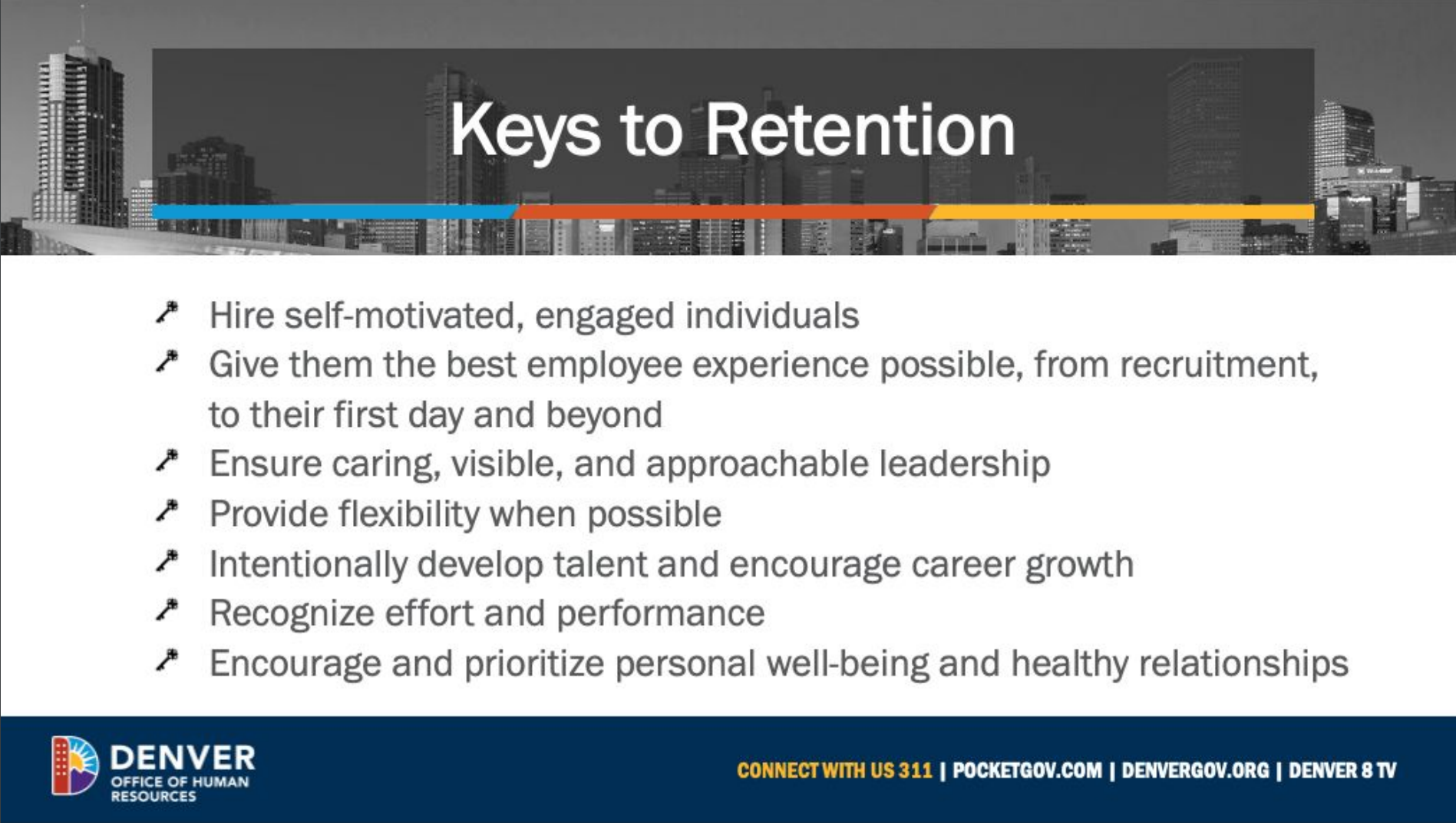“Conference Cliff Notes” is a series of short blog posts summarizing takeaways and ideas from NACTO’s 2023 Designing Cities Conference in Denver. Read more about the conference here.

From left to right: Midori Valdivia (Moderator), Alexandra Hallowell (MBTA), James Fisher (Miami-Dade County), Corren Johnson (BCDOT), and Jack Davies (DOTI)
Cities can’t transform their transportation systems if they don’t have the staff to develop and complete projects. But municipal hiring and retention in many cities is slow, cumbersome and ineffective, diminishing staff morale, derailing plans, and imperiling cities’ core functions. Moreover, while the flexibility and higher wages offered by the private sector have long posed a challenge to public sector employers, the problem for agencies looking to hire has become especially acute since the COVID-19 pandemic, and stretches across cities and agencies of various sizes and geographies.
The staffing challenges facing many transportation agencies was the impetus for “Uncivil List: What Needs to Change in Municipal Hiring,” a session at the #NACTO2023 Designing Cities Conference, where we heard from several leaders in the transportation field taking bold and thoughtful action to address these barriers and keep cities moving.
Moderated by MTA Board Member and consultant Midori Valdivia, the breakout session highlighted tangible action steps that cities can take to rise to the challenge, including investing in staff, partnering with HR departments to streamline hiring processes, and centering equity to create pathways for career advancement.
Staffing shortages tend to be hitting operations teams and shift workers the hardest, noted panelist Alexandra Hallowell, Director of Transit Priority at the MBTA. She suggested that leaders should proactively address workplace challenges that lead to early burnout, including eliminating split shifts and mandatory part time shifts. On the hiring side, agencies can partner with their HR departments to rethink minimum qualifications, and where appropriate, add workplace experience as a substitute for education level requirements.
The willingness of agency leadership to work collaboratively with HR departments is crucial to develop workable solutions to hiring slowdowns, panelist Jack Davies, HR Director for Denver’s Department of Transportation & Infrastructure (DOTI), told attendees.
For example, by calculating the real costs of turnover and auditing the hiring process, DOTI managed to cut its average hiring timeline from 70 days to 45 days! The agency did this by working with recruiters, hiring managers, and candidates to re-evaluate each step in its hiring process to determine whether it actually added value, creating new procedures that make it easier for candidates to apply with fewer steps and fewer clicks. The evaluation process helped DOTI determine that the longest delays came from scheduling and completing candidate interviews; as a result, they set more ambitious hiring timelines to better compete in a competitive labor market. The resulting savings also enabled DOTI to offer $5,000 hiring and retention bonuses to staff, a strategy that other session panelists touted as part of a successful incentivization strategy.

DOTI’s key strategies for retaining employees.
See more slides from this presentation. >>
Davies stressed that a key to retention is to focus on employee wellbeing and resilience, and challenged leaders to continuously ask themselves: “Are my employees and colleagues thriving?” By investing in leadership development, coaching programs, and public recognition for jobs well done, agencies can create a workplace culture where people feel valued and committed.
Corren Johnson, Interim Director of Baltimore City Department of Transportation (BCDOT) emphasized the need to create employment pipelines for hard-to-fill positions and more agile hiring practices. The agency has developed intra-agency pathways to earning Commercial Drivers Licenses (CDL). Baltimore City has promoted a citywide CDL bonus program that provides a $10,000 bonus to new hires–and rewards that same amount to existing drivers to strengthen retention. These strategies have enabled BCDOT to develop more consistent pipelines for new staff, enhances the ability to keep that staff at the agency longer, and recognizes the job dedication of existing employees. In her past recruitment efforts at the State level, Johnson has focused recruitment efforts on local job fairs and universities, where promising candidates may receive conditional job offers.
Other agencies have successfully partnered with local education institutions, too. Miami-Dade County Department of Transportation and Public Works, for example, has cultivated partnerships with local educational institutions such as community colleges, and collaborated with local community based organizations like homeless shelters to recruit drivers. DTPW’s 9-week training course certifies CDLs, explained James Fisher, Deputy Director and Chief Administrative Officer, and gets bus operators on the road quickly. Key to all of this is a strong emphasis on direct engagement and creating multiple onramps to career advancement.


The challenges posed by municipal hiring are complex and deep-seeded, and there are no silver bullet solutions. But through collaboration and creativity, cities can streamline hiring processes and offer compelling opportunities for professional growth that enable them to attract employees and offer them stable, long-term careers.
The same responsiveness and creative problem-solving that agencies exercised during the height of the COVID-19 pandemic, Hallowell suggested, can enable them to develop outcome-oriented solutions that empower workers and offer better service to their communities.